Contemporary Nursing Leadership and Practice: A Reflective Report
VerifiedAdded on 2022/10/01
|8
|3067
|175
Report
AI Summary
This report, addressing contemporary practice issues in nursing leadership and management, explores various facets of effective leadership, communication, and technological integration within healthcare settings. It begins by emphasizing the significance of communication skills in nursing leadership, highlighting their impact on patient outcomes and professional relationships. The report then delves into the challenges and opportunities presented by electronic health records (EHRs), particularly in aged care, discussing issues of privacy, security, and the need for staff training. Furthermore, it examines the potential of digital health and innovative technologies, such as huggable robots, to enhance patient care, especially in pediatric settings. The report also addresses role conflict, self-care strategies, and workplace attitudes, providing insights into maintaining professionalism and emotional intelligence. Finally, it reflects on personal development, emphasizing the importance of mindfulness, healthy habits, and ethical practices in nursing leadership. This report, written by a student, is published on Desklib, a platform offering study resources.
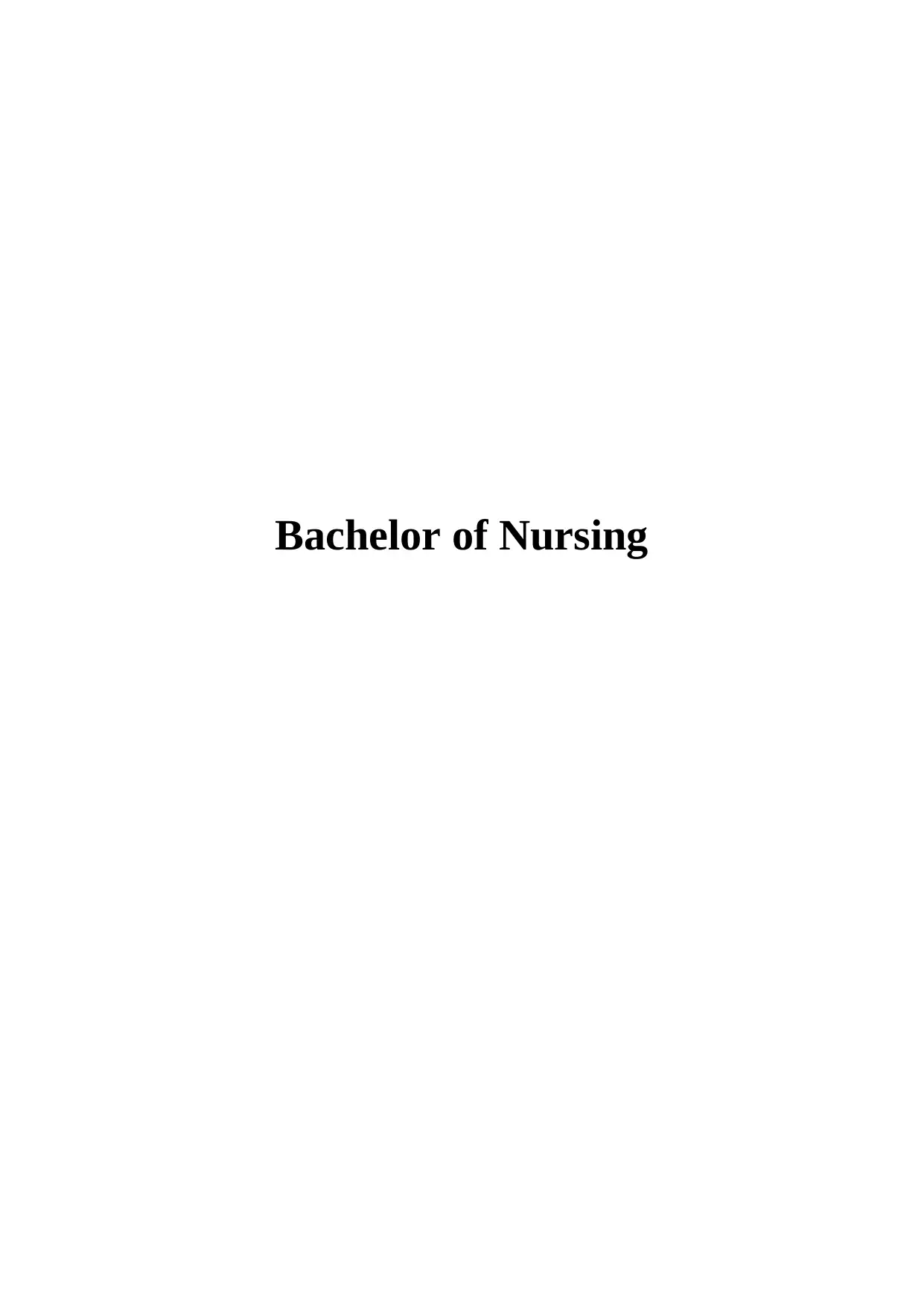
Bachelor of Nursing
Paraphrase This Document
Need a fresh take? Get an instant paraphrase of this document with our AI Paraphraser
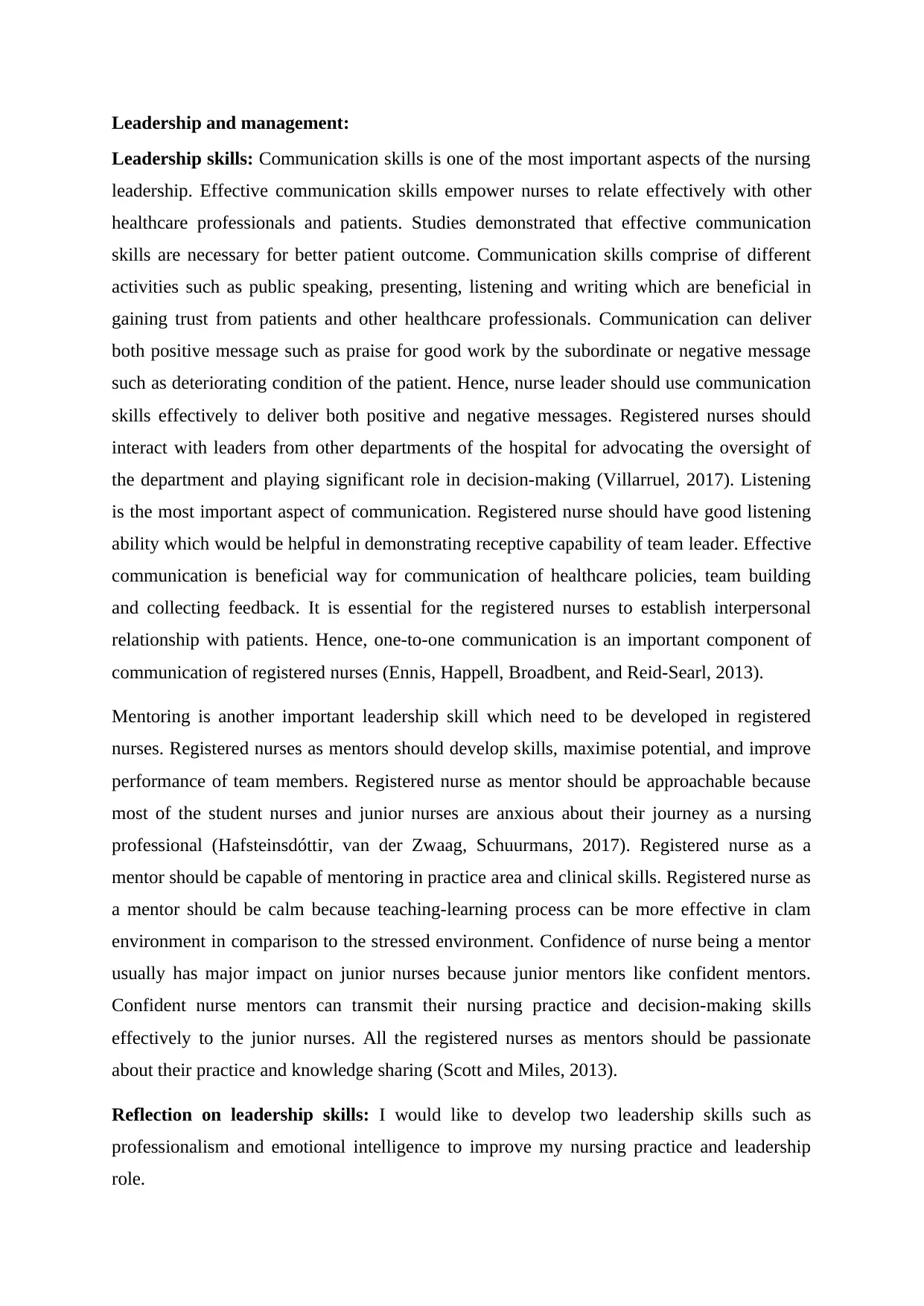
Leadership and management:
Leadership skills: Communication skills is one of the most important aspects of the nursing
leadership. Effective communication skills empower nurses to relate effectively with other
healthcare professionals and patients. Studies demonstrated that effective communication
skills are necessary for better patient outcome. Communication skills comprise of different
activities such as public speaking, presenting, listening and writing which are beneficial in
gaining trust from patients and other healthcare professionals. Communication can deliver
both positive message such as praise for good work by the subordinate or negative message
such as deteriorating condition of the patient. Hence, nurse leader should use communication
skills effectively to deliver both positive and negative messages. Registered nurses should
interact with leaders from other departments of the hospital for advocating the oversight of
the department and playing significant role in decision-making (Villarruel, 2017). Listening
is the most important aspect of communication. Registered nurse should have good listening
ability which would be helpful in demonstrating receptive capability of team leader. Effective
communication is beneficial way for communication of healthcare policies, team building
and collecting feedback. It is essential for the registered nurses to establish interpersonal
relationship with patients. Hence, one-to-one communication is an important component of
communication of registered nurses (Ennis, Happell, Broadbent, and Reid-Searl, 2013).
Mentoring is another important leadership skill which need to be developed in registered
nurses. Registered nurses as mentors should develop skills, maximise potential, and improve
performance of team members. Registered nurse as mentor should be approachable because
most of the student nurses and junior nurses are anxious about their journey as a nursing
professional (Hafsteinsdóttir, van der Zwaag, Schuurmans, 2017). Registered nurse as a
mentor should be capable of mentoring in practice area and clinical skills. Registered nurse as
a mentor should be calm because teaching-learning process can be more effective in clam
environment in comparison to the stressed environment. Confidence of nurse being a mentor
usually has major impact on junior nurses because junior mentors like confident mentors.
Confident nurse mentors can transmit their nursing practice and decision-making skills
effectively to the junior nurses. All the registered nurses as mentors should be passionate
about their practice and knowledge sharing (Scott and Miles, 2013).
Reflection on leadership skills: I would like to develop two leadership skills such as
professionalism and emotional intelligence to improve my nursing practice and leadership
role.
Leadership skills: Communication skills is one of the most important aspects of the nursing
leadership. Effective communication skills empower nurses to relate effectively with other
healthcare professionals and patients. Studies demonstrated that effective communication
skills are necessary for better patient outcome. Communication skills comprise of different
activities such as public speaking, presenting, listening and writing which are beneficial in
gaining trust from patients and other healthcare professionals. Communication can deliver
both positive message such as praise for good work by the subordinate or negative message
such as deteriorating condition of the patient. Hence, nurse leader should use communication
skills effectively to deliver both positive and negative messages. Registered nurses should
interact with leaders from other departments of the hospital for advocating the oversight of
the department and playing significant role in decision-making (Villarruel, 2017). Listening
is the most important aspect of communication. Registered nurse should have good listening
ability which would be helpful in demonstrating receptive capability of team leader. Effective
communication is beneficial way for communication of healthcare policies, team building
and collecting feedback. It is essential for the registered nurses to establish interpersonal
relationship with patients. Hence, one-to-one communication is an important component of
communication of registered nurses (Ennis, Happell, Broadbent, and Reid-Searl, 2013).
Mentoring is another important leadership skill which need to be developed in registered
nurses. Registered nurses as mentors should develop skills, maximise potential, and improve
performance of team members. Registered nurse as mentor should be approachable because
most of the student nurses and junior nurses are anxious about their journey as a nursing
professional (Hafsteinsdóttir, van der Zwaag, Schuurmans, 2017). Registered nurse as a
mentor should be capable of mentoring in practice area and clinical skills. Registered nurse as
a mentor should be calm because teaching-learning process can be more effective in clam
environment in comparison to the stressed environment. Confidence of nurse being a mentor
usually has major impact on junior nurses because junior mentors like confident mentors.
Confident nurse mentors can transmit their nursing practice and decision-making skills
effectively to the junior nurses. All the registered nurses as mentors should be passionate
about their practice and knowledge sharing (Scott and Miles, 2013).
Reflection on leadership skills: I would like to develop two leadership skills such as
professionalism and emotional intelligence to improve my nursing practice and leadership
role.
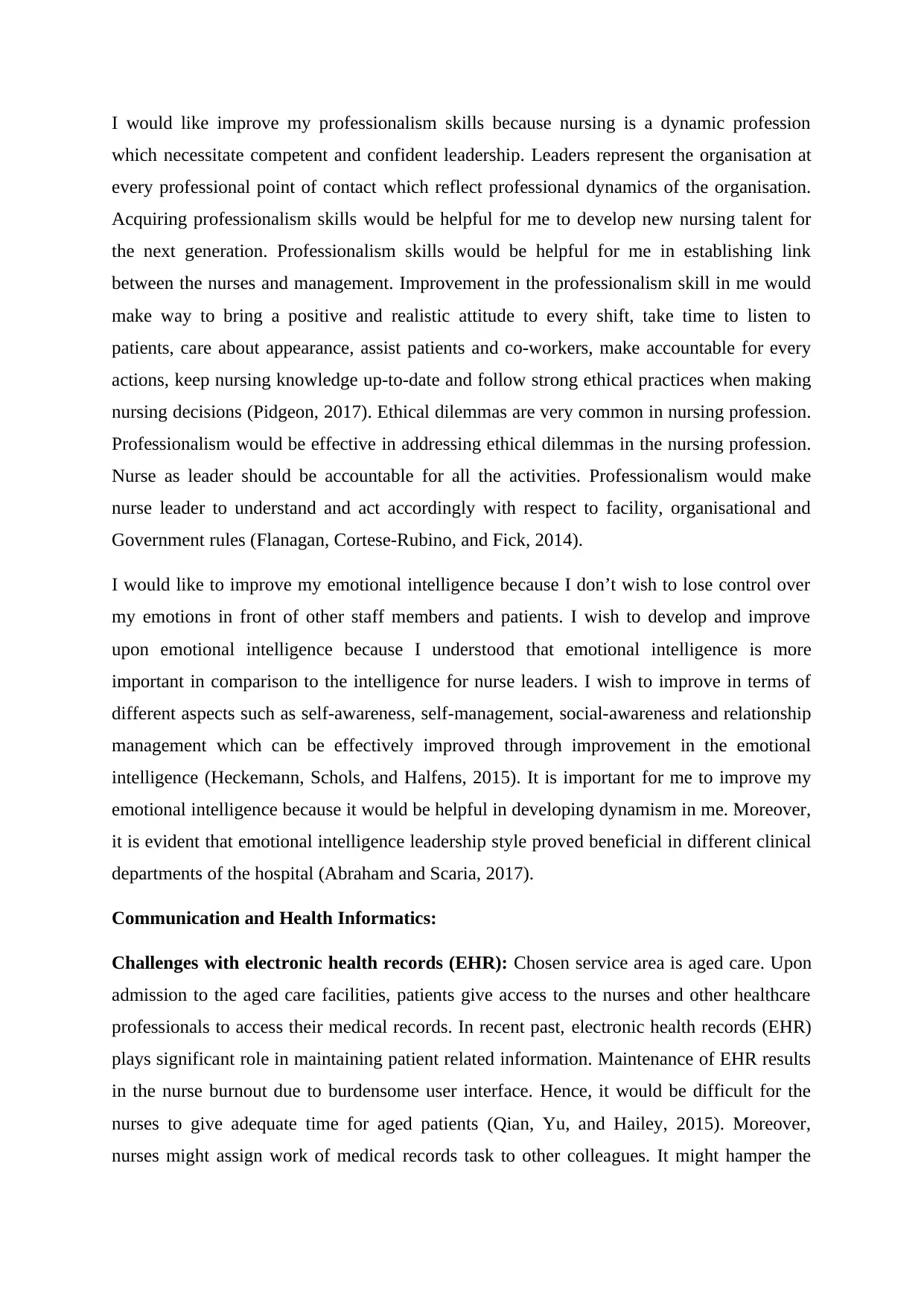
I would like improve my professionalism skills because nursing is a dynamic profession
which necessitate competent and confident leadership. Leaders represent the organisation at
every professional point of contact which reflect professional dynamics of the organisation.
Acquiring professionalism skills would be helpful for me to develop new nursing talent for
the next generation. Professionalism skills would be helpful for me in establishing link
between the nurses and management. Improvement in the professionalism skill in me would
make way to bring a positive and realistic attitude to every shift, take time to listen to
patients, care about appearance, assist patients and co-workers, make accountable for every
actions, keep nursing knowledge up-to-date and follow strong ethical practices when making
nursing decisions (Pidgeon, 2017). Ethical dilemmas are very common in nursing profession.
Professionalism would be effective in addressing ethical dilemmas in the nursing profession.
Nurse as leader should be accountable for all the activities. Professionalism would make
nurse leader to understand and act accordingly with respect to facility, organisational and
Government rules (Flanagan, Cortese-Rubino, and Fick, 2014).
I would like to improve my emotional intelligence because I don’t wish to lose control over
my emotions in front of other staff members and patients. I wish to develop and improve
upon emotional intelligence because I understood that emotional intelligence is more
important in comparison to the intelligence for nurse leaders. I wish to improve in terms of
different aspects such as self-awareness, self-management, social-awareness and relationship
management which can be effectively improved through improvement in the emotional
intelligence (Heckemann, Schols, and Halfens, 2015). It is important for me to improve my
emotional intelligence because it would be helpful in developing dynamism in me. Moreover,
it is evident that emotional intelligence leadership style proved beneficial in different clinical
departments of the hospital (Abraham and Scaria, 2017).
Communication and Health Informatics:
Challenges with electronic health records (EHR): Chosen service area is aged care. Upon
admission to the aged care facilities, patients give access to the nurses and other healthcare
professionals to access their medical records. In recent past, electronic health records (EHR)
plays significant role in maintaining patient related information. Maintenance of EHR results
in the nurse burnout due to burdensome user interface. Hence, it would be difficult for the
nurses to give adequate time for aged patients (Qian, Yu, and Hailey, 2015). Moreover,
nurses might assign work of medical records task to other colleagues. It might hamper the
which necessitate competent and confident leadership. Leaders represent the organisation at
every professional point of contact which reflect professional dynamics of the organisation.
Acquiring professionalism skills would be helpful for me to develop new nursing talent for
the next generation. Professionalism skills would be helpful for me in establishing link
between the nurses and management. Improvement in the professionalism skill in me would
make way to bring a positive and realistic attitude to every shift, take time to listen to
patients, care about appearance, assist patients and co-workers, make accountable for every
actions, keep nursing knowledge up-to-date and follow strong ethical practices when making
nursing decisions (Pidgeon, 2017). Ethical dilemmas are very common in nursing profession.
Professionalism would be effective in addressing ethical dilemmas in the nursing profession.
Nurse as leader should be accountable for all the activities. Professionalism would make
nurse leader to understand and act accordingly with respect to facility, organisational and
Government rules (Flanagan, Cortese-Rubino, and Fick, 2014).
I would like to improve my emotional intelligence because I don’t wish to lose control over
my emotions in front of other staff members and patients. I wish to develop and improve
upon emotional intelligence because I understood that emotional intelligence is more
important in comparison to the intelligence for nurse leaders. I wish to improve in terms of
different aspects such as self-awareness, self-management, social-awareness and relationship
management which can be effectively improved through improvement in the emotional
intelligence (Heckemann, Schols, and Halfens, 2015). It is important for me to improve my
emotional intelligence because it would be helpful in developing dynamism in me. Moreover,
it is evident that emotional intelligence leadership style proved beneficial in different clinical
departments of the hospital (Abraham and Scaria, 2017).
Communication and Health Informatics:
Challenges with electronic health records (EHR): Chosen service area is aged care. Upon
admission to the aged care facilities, patients give access to the nurses and other healthcare
professionals to access their medical records. In recent past, electronic health records (EHR)
plays significant role in maintaining patient related information. Maintenance of EHR results
in the nurse burnout due to burdensome user interface. Hence, it would be difficult for the
nurses to give adequate time for aged patients (Qian, Yu, and Hailey, 2015). Moreover,
nurses might assign work of medical records task to other colleagues. It might hamper the
⊘ This is a preview!⊘
Do you want full access?
Subscribe today to unlock all pages.

Trusted by 1+ million students worldwide
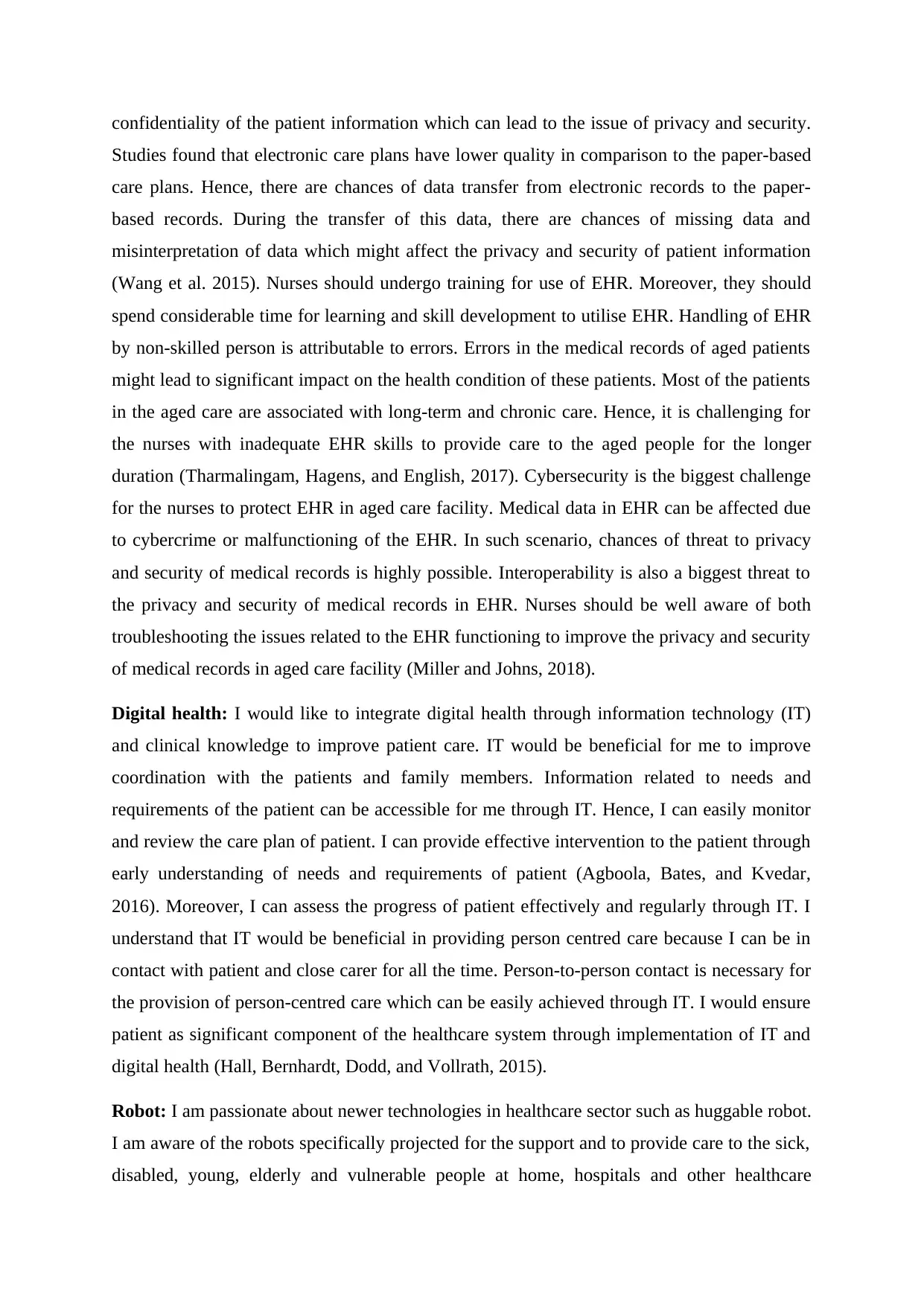
confidentiality of the patient information which can lead to the issue of privacy and security.
Studies found that electronic care plans have lower quality in comparison to the paper-based
care plans. Hence, there are chances of data transfer from electronic records to the paper-
based records. During the transfer of this data, there are chances of missing data and
misinterpretation of data which might affect the privacy and security of patient information
(Wang et al. 2015). Nurses should undergo training for use of EHR. Moreover, they should
spend considerable time for learning and skill development to utilise EHR. Handling of EHR
by non-skilled person is attributable to errors. Errors in the medical records of aged patients
might lead to significant impact on the health condition of these patients. Most of the patients
in the aged care are associated with long-term and chronic care. Hence, it is challenging for
the nurses with inadequate EHR skills to provide care to the aged people for the longer
duration (Tharmalingam, Hagens, and English, 2017). Cybersecurity is the biggest challenge
for the nurses to protect EHR in aged care facility. Medical data in EHR can be affected due
to cybercrime or malfunctioning of the EHR. In such scenario, chances of threat to privacy
and security of medical records is highly possible. Interoperability is also a biggest threat to
the privacy and security of medical records in EHR. Nurses should be well aware of both
troubleshooting the issues related to the EHR functioning to improve the privacy and security
of medical records in aged care facility (Miller and Johns, 2018).
Digital health: I would like to integrate digital health through information technology (IT)
and clinical knowledge to improve patient care. IT would be beneficial for me to improve
coordination with the patients and family members. Information related to needs and
requirements of the patient can be accessible for me through IT. Hence, I can easily monitor
and review the care plan of patient. I can provide effective intervention to the patient through
early understanding of needs and requirements of patient (Agboola, Bates, and Kvedar,
2016). Moreover, I can assess the progress of patient effectively and regularly through IT. I
understand that IT would be beneficial in providing person centred care because I can be in
contact with patient and close carer for all the time. Person-to-person contact is necessary for
the provision of person-centred care which can be easily achieved through IT. I would ensure
patient as significant component of the healthcare system through implementation of IT and
digital health (Hall, Bernhardt, Dodd, and Vollrath, 2015).
Robot: I am passionate about newer technologies in healthcare sector such as huggable robot.
I am aware of the robots specifically projected for the support and to provide care to the sick,
disabled, young, elderly and vulnerable people at home, hospitals and other healthcare
Studies found that electronic care plans have lower quality in comparison to the paper-based
care plans. Hence, there are chances of data transfer from electronic records to the paper-
based records. During the transfer of this data, there are chances of missing data and
misinterpretation of data which might affect the privacy and security of patient information
(Wang et al. 2015). Nurses should undergo training for use of EHR. Moreover, they should
spend considerable time for learning and skill development to utilise EHR. Handling of EHR
by non-skilled person is attributable to errors. Errors in the medical records of aged patients
might lead to significant impact on the health condition of these patients. Most of the patients
in the aged care are associated with long-term and chronic care. Hence, it is challenging for
the nurses with inadequate EHR skills to provide care to the aged people for the longer
duration (Tharmalingam, Hagens, and English, 2017). Cybersecurity is the biggest challenge
for the nurses to protect EHR in aged care facility. Medical data in EHR can be affected due
to cybercrime or malfunctioning of the EHR. In such scenario, chances of threat to privacy
and security of medical records is highly possible. Interoperability is also a biggest threat to
the privacy and security of medical records in EHR. Nurses should be well aware of both
troubleshooting the issues related to the EHR functioning to improve the privacy and security
of medical records in aged care facility (Miller and Johns, 2018).
Digital health: I would like to integrate digital health through information technology (IT)
and clinical knowledge to improve patient care. IT would be beneficial for me to improve
coordination with the patients and family members. Information related to needs and
requirements of the patient can be accessible for me through IT. Hence, I can easily monitor
and review the care plan of patient. I can provide effective intervention to the patient through
early understanding of needs and requirements of patient (Agboola, Bates, and Kvedar,
2016). Moreover, I can assess the progress of patient effectively and regularly through IT. I
understand that IT would be beneficial in providing person centred care because I can be in
contact with patient and close carer for all the time. Person-to-person contact is necessary for
the provision of person-centred care which can be easily achieved through IT. I would ensure
patient as significant component of the healthcare system through implementation of IT and
digital health (Hall, Bernhardt, Dodd, and Vollrath, 2015).
Robot: I am passionate about newer technologies in healthcare sector such as huggable robot.
I am aware of the robots specifically projected for the support and to provide care to the sick,
disabled, young, elderly and vulnerable people at home, hospitals and other healthcare
Paraphrase This Document
Need a fresh take? Get an instant paraphrase of this document with our AI Paraphraser
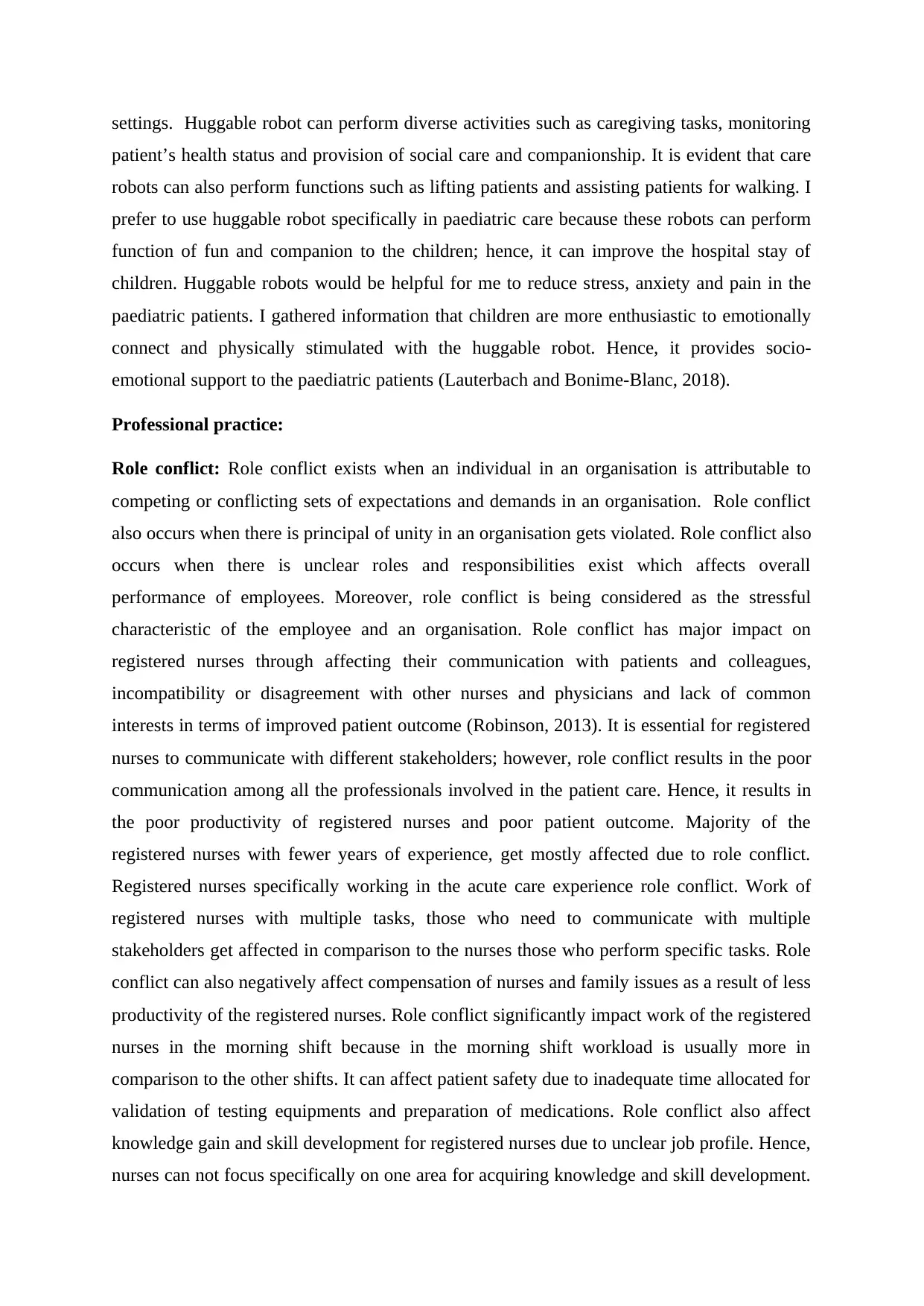
settings. Huggable robot can perform diverse activities such as caregiving tasks, monitoring
patient’s health status and provision of social care and companionship. It is evident that care
robots can also perform functions such as lifting patients and assisting patients for walking. I
prefer to use huggable robot specifically in paediatric care because these robots can perform
function of fun and companion to the children; hence, it can improve the hospital stay of
children. Huggable robots would be helpful for me to reduce stress, anxiety and pain in the
paediatric patients. I gathered information that children are more enthusiastic to emotionally
connect and physically stimulated with the huggable robot. Hence, it provides socio-
emotional support to the paediatric patients (Lauterbach and Bonime-Blanc, 2018).
Professional practice:
Role conflict: Role conflict exists when an individual in an organisation is attributable to
competing or conflicting sets of expectations and demands in an organisation. Role conflict
also occurs when there is principal of unity in an organisation gets violated. Role conflict also
occurs when there is unclear roles and responsibilities exist which affects overall
performance of employees. Moreover, role conflict is being considered as the stressful
characteristic of the employee and an organisation. Role conflict has major impact on
registered nurses through affecting their communication with patients and colleagues,
incompatibility or disagreement with other nurses and physicians and lack of common
interests in terms of improved patient outcome (Robinson, 2013). It is essential for registered
nurses to communicate with different stakeholders; however, role conflict results in the poor
communication among all the professionals involved in the patient care. Hence, it results in
the poor productivity of registered nurses and poor patient outcome. Majority of the
registered nurses with fewer years of experience, get mostly affected due to role conflict.
Registered nurses specifically working in the acute care experience role conflict. Work of
registered nurses with multiple tasks, those who need to communicate with multiple
stakeholders get affected in comparison to the nurses those who perform specific tasks. Role
conflict can also negatively affect compensation of nurses and family issues as a result of less
productivity of the registered nurses. Role conflict significantly impact work of the registered
nurses in the morning shift because in the morning shift workload is usually more in
comparison to the other shifts. It can affect patient safety due to inadequate time allocated for
validation of testing equipments and preparation of medications. Role conflict also affect
knowledge gain and skill development for registered nurses due to unclear job profile. Hence,
nurses can not focus specifically on one area for acquiring knowledge and skill development.
patient’s health status and provision of social care and companionship. It is evident that care
robots can also perform functions such as lifting patients and assisting patients for walking. I
prefer to use huggable robot specifically in paediatric care because these robots can perform
function of fun and companion to the children; hence, it can improve the hospital stay of
children. Huggable robots would be helpful for me to reduce stress, anxiety and pain in the
paediatric patients. I gathered information that children are more enthusiastic to emotionally
connect and physically stimulated with the huggable robot. Hence, it provides socio-
emotional support to the paediatric patients (Lauterbach and Bonime-Blanc, 2018).
Professional practice:
Role conflict: Role conflict exists when an individual in an organisation is attributable to
competing or conflicting sets of expectations and demands in an organisation. Role conflict
also occurs when there is principal of unity in an organisation gets violated. Role conflict also
occurs when there is unclear roles and responsibilities exist which affects overall
performance of employees. Moreover, role conflict is being considered as the stressful
characteristic of the employee and an organisation. Role conflict has major impact on
registered nurses through affecting their communication with patients and colleagues,
incompatibility or disagreement with other nurses and physicians and lack of common
interests in terms of improved patient outcome (Robinson, 2013). It is essential for registered
nurses to communicate with different stakeholders; however, role conflict results in the poor
communication among all the professionals involved in the patient care. Hence, it results in
the poor productivity of registered nurses and poor patient outcome. Majority of the
registered nurses with fewer years of experience, get mostly affected due to role conflict.
Registered nurses specifically working in the acute care experience role conflict. Work of
registered nurses with multiple tasks, those who need to communicate with multiple
stakeholders get affected in comparison to the nurses those who perform specific tasks. Role
conflict can also negatively affect compensation of nurses and family issues as a result of less
productivity of the registered nurses. Role conflict significantly impact work of the registered
nurses in the morning shift because in the morning shift workload is usually more in
comparison to the other shifts. It can affect patient safety due to inadequate time allocated for
validation of testing equipments and preparation of medications. Role conflict also affect
knowledge gain and skill development for registered nurses due to unclear job profile. Hence,
nurses can not focus specifically on one area for acquiring knowledge and skill development.
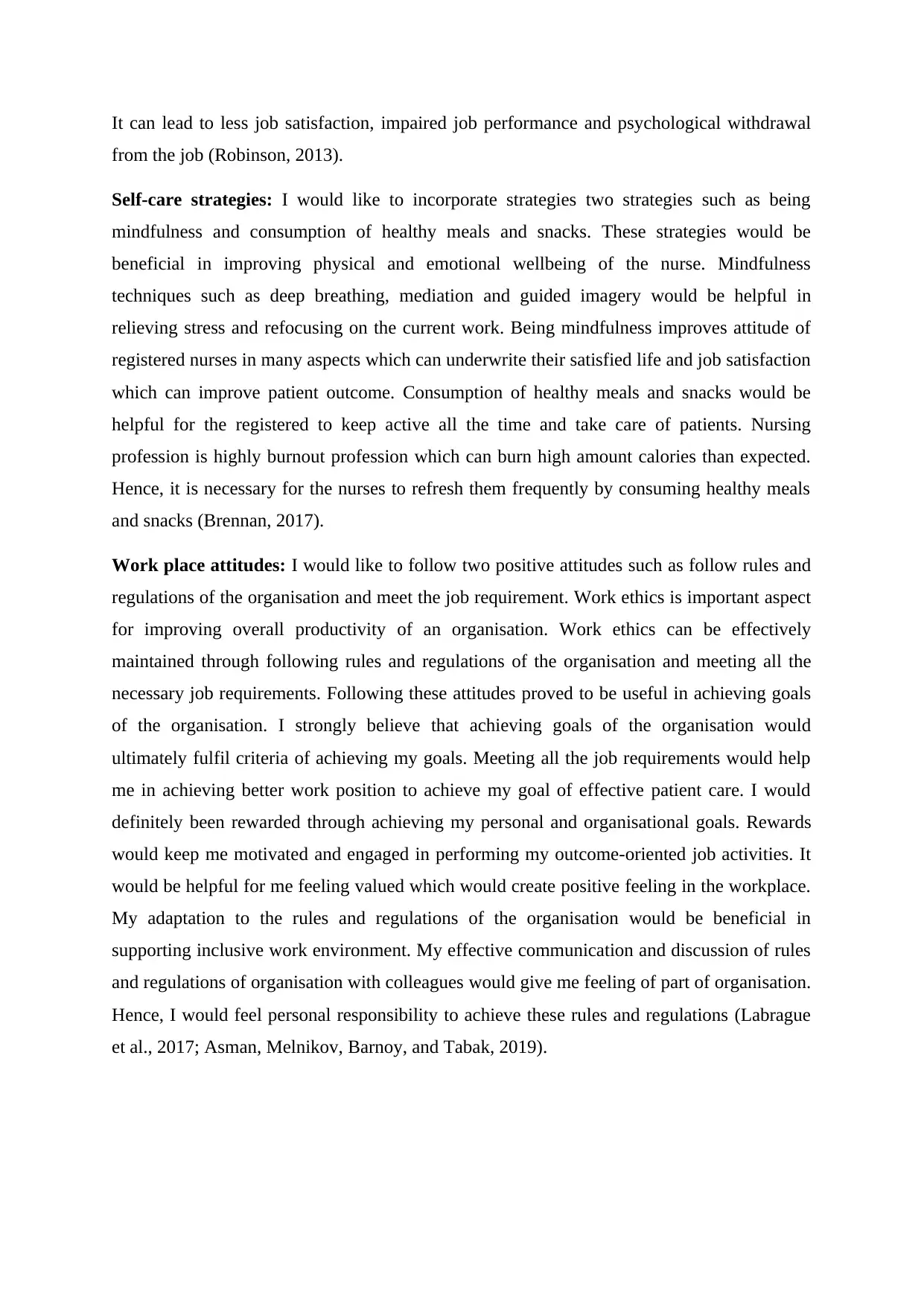
It can lead to less job satisfaction, impaired job performance and psychological withdrawal
from the job (Robinson, 2013).
Self-care strategies: I would like to incorporate strategies two strategies such as being
mindfulness and consumption of healthy meals and snacks. These strategies would be
beneficial in improving physical and emotional wellbeing of the nurse. Mindfulness
techniques such as deep breathing, mediation and guided imagery would be helpful in
relieving stress and refocusing on the current work. Being mindfulness improves attitude of
registered nurses in many aspects which can underwrite their satisfied life and job satisfaction
which can improve patient outcome. Consumption of healthy meals and snacks would be
helpful for the registered to keep active all the time and take care of patients. Nursing
profession is highly burnout profession which can burn high amount calories than expected.
Hence, it is necessary for the nurses to refresh them frequently by consuming healthy meals
and snacks (Brennan, 2017).
Work place attitudes: I would like to follow two positive attitudes such as follow rules and
regulations of the organisation and meet the job requirement. Work ethics is important aspect
for improving overall productivity of an organisation. Work ethics can be effectively
maintained through following rules and regulations of the organisation and meeting all the
necessary job requirements. Following these attitudes proved to be useful in achieving goals
of the organisation. I strongly believe that achieving goals of the organisation would
ultimately fulfil criteria of achieving my goals. Meeting all the job requirements would help
me in achieving better work position to achieve my goal of effective patient care. I would
definitely been rewarded through achieving my personal and organisational goals. Rewards
would keep me motivated and engaged in performing my outcome-oriented job activities. It
would be helpful for me feeling valued which would create positive feeling in the workplace.
My adaptation to the rules and regulations of the organisation would be beneficial in
supporting inclusive work environment. My effective communication and discussion of rules
and regulations of organisation with colleagues would give me feeling of part of organisation.
Hence, I would feel personal responsibility to achieve these rules and regulations (Labrague
et al., 2017; Asman, Melnikov, Barnoy, and Tabak, 2019).
from the job (Robinson, 2013).
Self-care strategies: I would like to incorporate strategies two strategies such as being
mindfulness and consumption of healthy meals and snacks. These strategies would be
beneficial in improving physical and emotional wellbeing of the nurse. Mindfulness
techniques such as deep breathing, mediation and guided imagery would be helpful in
relieving stress and refocusing on the current work. Being mindfulness improves attitude of
registered nurses in many aspects which can underwrite their satisfied life and job satisfaction
which can improve patient outcome. Consumption of healthy meals and snacks would be
helpful for the registered to keep active all the time and take care of patients. Nursing
profession is highly burnout profession which can burn high amount calories than expected.
Hence, it is necessary for the nurses to refresh them frequently by consuming healthy meals
and snacks (Brennan, 2017).
Work place attitudes: I would like to follow two positive attitudes such as follow rules and
regulations of the organisation and meet the job requirement. Work ethics is important aspect
for improving overall productivity of an organisation. Work ethics can be effectively
maintained through following rules and regulations of the organisation and meeting all the
necessary job requirements. Following these attitudes proved to be useful in achieving goals
of the organisation. I strongly believe that achieving goals of the organisation would
ultimately fulfil criteria of achieving my goals. Meeting all the job requirements would help
me in achieving better work position to achieve my goal of effective patient care. I would
definitely been rewarded through achieving my personal and organisational goals. Rewards
would keep me motivated and engaged in performing my outcome-oriented job activities. It
would be helpful for me feeling valued which would create positive feeling in the workplace.
My adaptation to the rules and regulations of the organisation would be beneficial in
supporting inclusive work environment. My effective communication and discussion of rules
and regulations of organisation with colleagues would give me feeling of part of organisation.
Hence, I would feel personal responsibility to achieve these rules and regulations (Labrague
et al., 2017; Asman, Melnikov, Barnoy, and Tabak, 2019).
⊘ This is a preview!⊘
Do you want full access?
Subscribe today to unlock all pages.

Trusted by 1+ million students worldwide
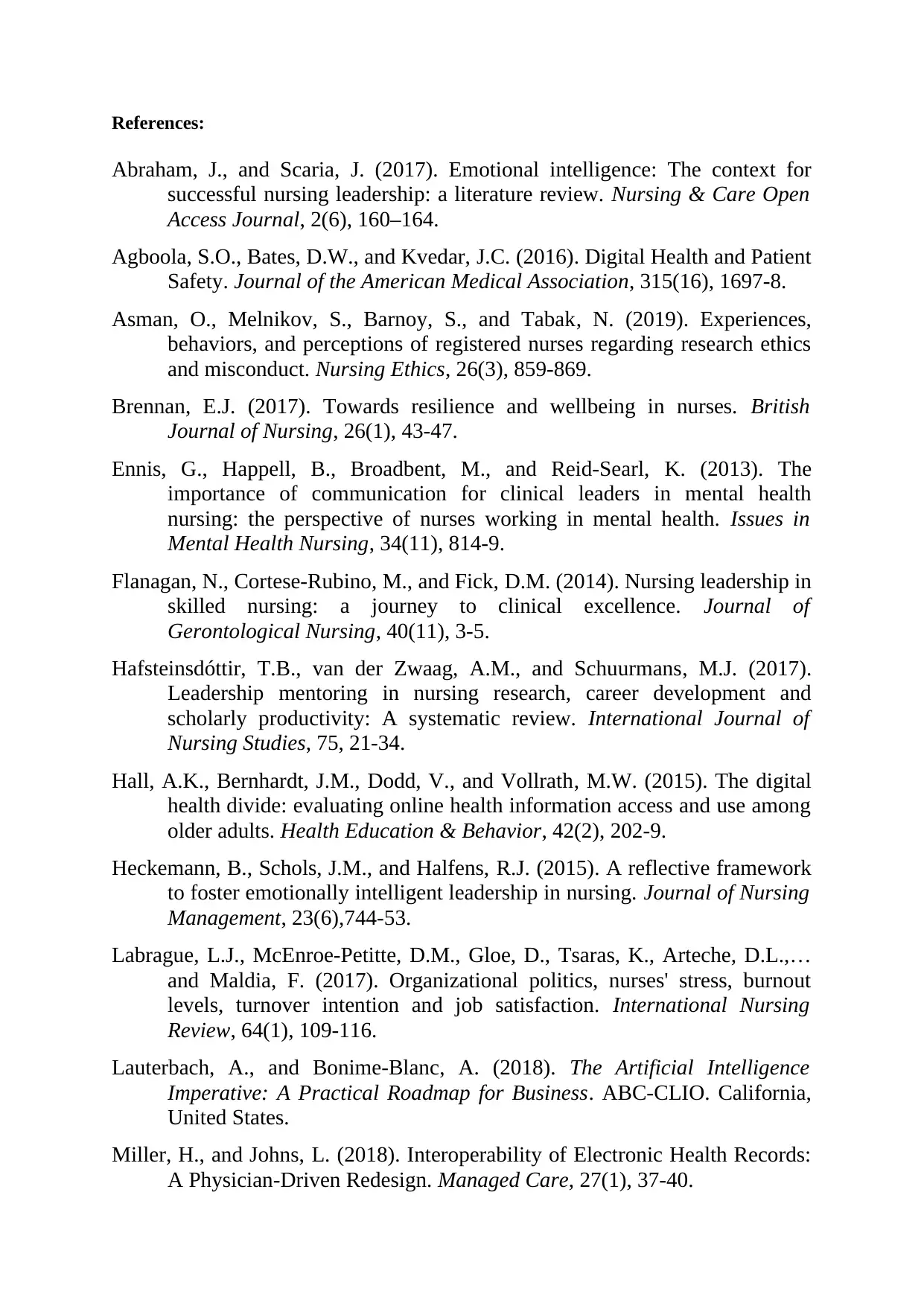
References:
Abraham, J., and Scaria, J. (2017). Emotional intelligence: The context for
successful nursing leadership: a literature review. Nursing & Care Open
Access Journal, 2(6), 160‒164.
Agboola, S.O., Bates, D.W., and Kvedar, J.C. (2016). Digital Health and Patient
Safety. Journal of the American Medical Association, 315(16), 1697-8.
Asman, O., Melnikov, S., Barnoy, S., and Tabak, N. (2019). Experiences,
behaviors, and perceptions of registered nurses regarding research ethics
and misconduct. Nursing Ethics, 26(3), 859-869.
Brennan, E.J. (2017). Towards resilience and wellbeing in nurses. British
Journal of Nursing, 26(1), 43-47.
Ennis, G., Happell, B., Broadbent, M., and Reid-Searl, K. (2013). The
importance of communication for clinical leaders in mental health
nursing: the perspective of nurses working in mental health. Issues in
Mental Health Nursing, 34(11), 814-9.
Flanagan, N., Cortese-Rubino, M., and Fick, D.M. (2014). Nursing leadership in
skilled nursing: a journey to clinical excellence. Journal of
Gerontological Nursing, 40(11), 3-5.
Hafsteinsdóttir, T.B., van der Zwaag, A.M., and Schuurmans, M.J. (2017).
Leadership mentoring in nursing research, career development and
scholarly productivity: A systematic review. International Journal of
Nursing Studies, 75, 21-34.
Hall, A.K., Bernhardt, J.M., Dodd, V., and Vollrath, M.W. (2015). The digital
health divide: evaluating online health information access and use among
older adults. Health Education & Behavior, 42(2), 202-9.
Heckemann, B., Schols, J.M., and Halfens, R.J. (2015). A reflective framework
to foster emotionally intelligent leadership in nursing. Journal of Nursing
Management, 23(6),744-53.
Labrague, L.J., McEnroe-Petitte, D.M., Gloe, D., Tsaras, K., Arteche, D.L.,…
and Maldia, F. (2017). Organizational politics, nurses' stress, burnout
levels, turnover intention and job satisfaction. International Nursing
Review, 64(1), 109-116.
Lauterbach, A., and Bonime-Blanc, A. (2018). The Artificial Intelligence
Imperative: A Practical Roadmap for Business. ABC-CLIO. California,
United States.
Miller, H., and Johns, L. (2018). Interoperability of Electronic Health Records:
A Physician-Driven Redesign. Managed Care, 27(1), 37-40.
Abraham, J., and Scaria, J. (2017). Emotional intelligence: The context for
successful nursing leadership: a literature review. Nursing & Care Open
Access Journal, 2(6), 160‒164.
Agboola, S.O., Bates, D.W., and Kvedar, J.C. (2016). Digital Health and Patient
Safety. Journal of the American Medical Association, 315(16), 1697-8.
Asman, O., Melnikov, S., Barnoy, S., and Tabak, N. (2019). Experiences,
behaviors, and perceptions of registered nurses regarding research ethics
and misconduct. Nursing Ethics, 26(3), 859-869.
Brennan, E.J. (2017). Towards resilience and wellbeing in nurses. British
Journal of Nursing, 26(1), 43-47.
Ennis, G., Happell, B., Broadbent, M., and Reid-Searl, K. (2013). The
importance of communication for clinical leaders in mental health
nursing: the perspective of nurses working in mental health. Issues in
Mental Health Nursing, 34(11), 814-9.
Flanagan, N., Cortese-Rubino, M., and Fick, D.M. (2014). Nursing leadership in
skilled nursing: a journey to clinical excellence. Journal of
Gerontological Nursing, 40(11), 3-5.
Hafsteinsdóttir, T.B., van der Zwaag, A.M., and Schuurmans, M.J. (2017).
Leadership mentoring in nursing research, career development and
scholarly productivity: A systematic review. International Journal of
Nursing Studies, 75, 21-34.
Hall, A.K., Bernhardt, J.M., Dodd, V., and Vollrath, M.W. (2015). The digital
health divide: evaluating online health information access and use among
older adults. Health Education & Behavior, 42(2), 202-9.
Heckemann, B., Schols, J.M., and Halfens, R.J. (2015). A reflective framework
to foster emotionally intelligent leadership in nursing. Journal of Nursing
Management, 23(6),744-53.
Labrague, L.J., McEnroe-Petitte, D.M., Gloe, D., Tsaras, K., Arteche, D.L.,…
and Maldia, F. (2017). Organizational politics, nurses' stress, burnout
levels, turnover intention and job satisfaction. International Nursing
Review, 64(1), 109-116.
Lauterbach, A., and Bonime-Blanc, A. (2018). The Artificial Intelligence
Imperative: A Practical Roadmap for Business. ABC-CLIO. California,
United States.
Miller, H., and Johns, L. (2018). Interoperability of Electronic Health Records:
A Physician-Driven Redesign. Managed Care, 27(1), 37-40.
Paraphrase This Document
Need a fresh take? Get an instant paraphrase of this document with our AI Paraphraser
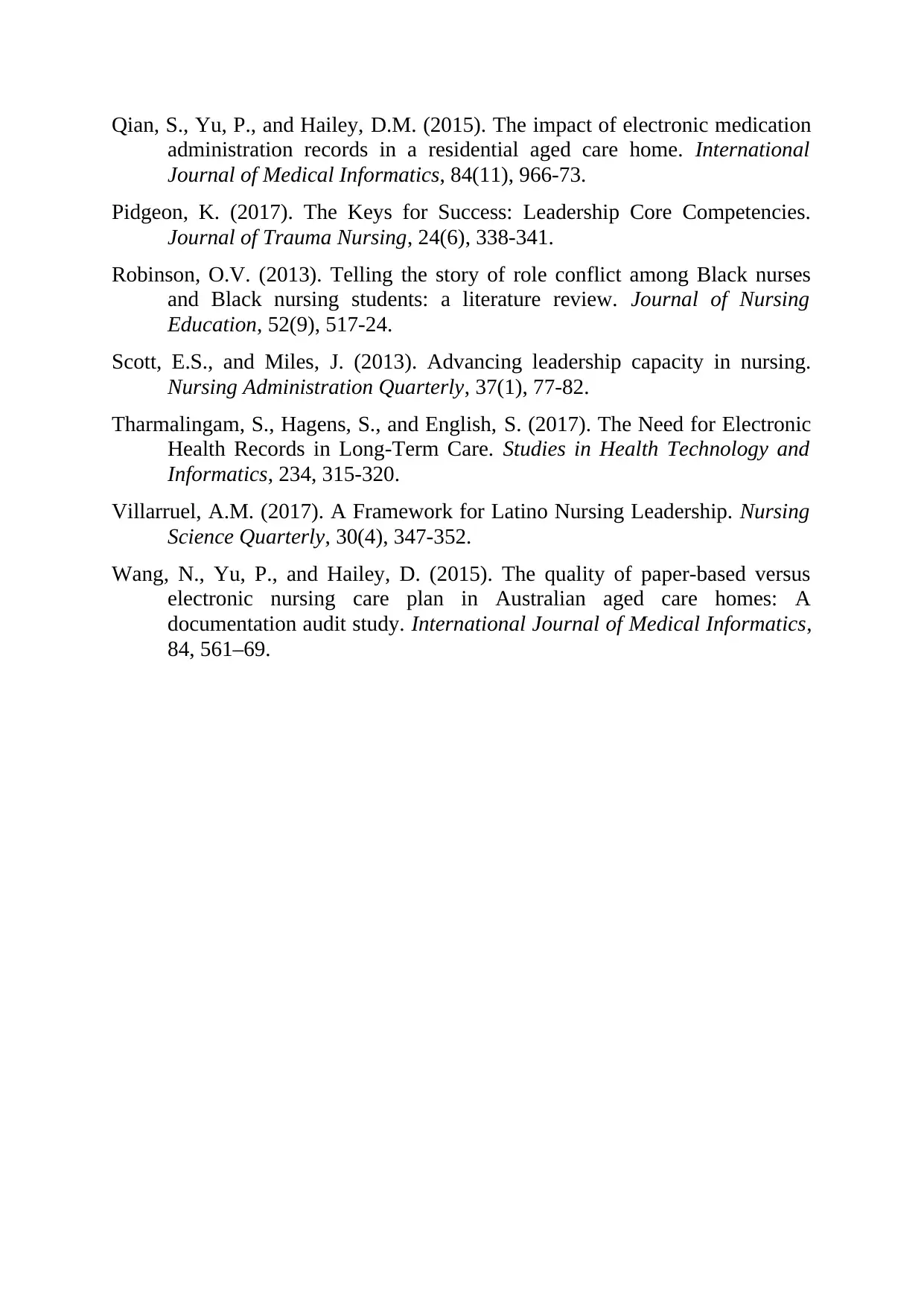
Qian, S., Yu, P., and Hailey, D.M. (2015). The impact of electronic medication
administration records in a residential aged care home. International
Journal of Medical Informatics, 84(11), 966-73.
Pidgeon, K. (2017). The Keys for Success: Leadership Core Competencies.
Journal of Trauma Nursing, 24(6), 338-341.
Robinson, O.V. (2013). Telling the story of role conflict among Black nurses
and Black nursing students: a literature review. Journal of Nursing
Education, 52(9), 517-24.
Scott, E.S., and Miles, J. (2013). Advancing leadership capacity in nursing.
Nursing Administration Quarterly, 37(1), 77-82.
Tharmalingam, S., Hagens, S., and English, S. (2017). The Need for Electronic
Health Records in Long-Term Care. Studies in Health Technology and
Informatics, 234, 315-320.
Villarruel, A.M. (2017). A Framework for Latino Nursing Leadership. Nursing
Science Quarterly, 30(4), 347-352.
Wang, N., Yu, P., and Hailey, D. (2015). The quality of paper-based versus
electronic nursing care plan in Australian aged care homes: A
documentation audit study. International Journal of Medical Informatics,
84, 561–69.
administration records in a residential aged care home. International
Journal of Medical Informatics, 84(11), 966-73.
Pidgeon, K. (2017). The Keys for Success: Leadership Core Competencies.
Journal of Trauma Nursing, 24(6), 338-341.
Robinson, O.V. (2013). Telling the story of role conflict among Black nurses
and Black nursing students: a literature review. Journal of Nursing
Education, 52(9), 517-24.
Scott, E.S., and Miles, J. (2013). Advancing leadership capacity in nursing.
Nursing Administration Quarterly, 37(1), 77-82.
Tharmalingam, S., Hagens, S., and English, S. (2017). The Need for Electronic
Health Records in Long-Term Care. Studies in Health Technology and
Informatics, 234, 315-320.
Villarruel, A.M. (2017). A Framework for Latino Nursing Leadership. Nursing
Science Quarterly, 30(4), 347-352.
Wang, N., Yu, P., and Hailey, D. (2015). The quality of paper-based versus
electronic nursing care plan in Australian aged care homes: A
documentation audit study. International Journal of Medical Informatics,
84, 561–69.
1 out of 8
Related Documents
Your All-in-One AI-Powered Toolkit for Academic Success.
+13062052269
info@desklib.com
Available 24*7 on WhatsApp / Email
![[object Object]](/_next/static/media/star-bottom.7253800d.svg)
Unlock your academic potential
Copyright © 2020–2026 A2Z Services. All Rights Reserved. Developed and managed by ZUCOL.





